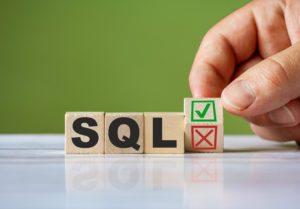We all know that in 2022, data is a significant currency.
Increasingly, business strategies are data-driven. Organisations across every area of industry are looking to mine and manage their data. They are looking to leverage the significant advantages that its data holds.
As digitalisation sweeps across the commercial landscape, businesses will hold and use a vast accumulation of data. Without effective management, this data are just numbers…unusable and meaningless. This is where SQL and SQL developers step in.
Thanks to the continuing importance of Structured Query Language in managing data, SQL developers are in as high demand as ever.

What do SQL Developers do?
SQL Developers hold the keys to the database kingdom.
They are responsible for the design, creation, and maintenance of databases. This includes
- Building databases and validating their stability and efficiency
- Creating program views, functions, and stored procedures
- Writing optimized SQL queries for integration with other applications
- Designing database tables and dictionaries
- Developing scripts, procedures, and triggers for application development
- Maintaining data quality and backups and overseeing database security
Post-pandemic, SQL developers are more important than ever before. In the age of remote working, connections made to databases have increased. Businesses rely on databases more than ever.

What do I need to be an SQL database developer?
Programming experience.
In an ideal world, SQL developers should have experience working in a development environment like Oracle SQL Developer.
Programming requirements will vary from organisation to organisation, but SQL developers should have a working knowledge of the relevant application language. This may be Python, C#, or Java, for example.
When working with MySQL, it’s likely developers will need experience with PHP. On top of this, a background in Unix is a big plus.
If you really want to make your CV stand out, SQL developers may look to work to get an understanding of Bash or Windows batch scripts.

Database knowledge.
Oracle remains the world’s most popular database environment, but specialisation is still the key to getting a top SQL database developer job. When choosing an area of expertise, open-source MySQL is prevalent in web development while many other businesses prefer to work with Microsoft SQL Server.
Experts advise that as an aspiring SQL developer, you should aim to become an expert in one system rather than working within multiple database environments.
SQL developers will need to be exposed to production databases. You’ll also require an understanding of data warehousing concepts and be able to handle some or all the following-
- Integrated development environments like Oracle SQL Developer
- Reporting and business intelligence tools like Microsoft SQL Server Reporting Services (SSRS) and SAP Crystal Reports
- NoSQL database systems, such as MongoDB and CouchDB
- Big data technologies like Hadoop and Spark
- Cloud services like Amazon AWS and Microsoft Azure
- The Software Development Life Cycle (specifically Scrum) and the Agile methodology

Certifications.
Certifications can be advantageous for aspiring SQL developers. Some recommended qualifications are
- Oracle Database PL/SQL Developer Certified Professional
- Microsoft-Certified IT Professional (MCITP).
A route in.
One way to become an SQL developer is to grow your skills as you work. The job of a database administrator is a good place to start, as is software development. You may also like to get some experience working with other database environments such as Oracle or MySQL. Side projects are also a great learning curve offering room to make mistakes and learn without any commercial pressures.

Soft Skills.
Communication is a highly prized skill in tech teams. SQL developers will need positive working relationships with colleagues across the IT department and third-party vendors, such as cloud service providers.
Working alongside other subject matter experts is key for SQL developers. These collaborative relationships are especially important in the advent of data analytics. On top of this, it is common for non-technical colleagues to have questions regarding their data needs. Marketing, operations, and other teams will have queries around data capture and running business intelligence reports. You’ll need to be able to speak in non-technical terms about all these things to help them.
Are you looking for your next tech job? We can help.
Head over to our job page to browse through all our digital jobs!





